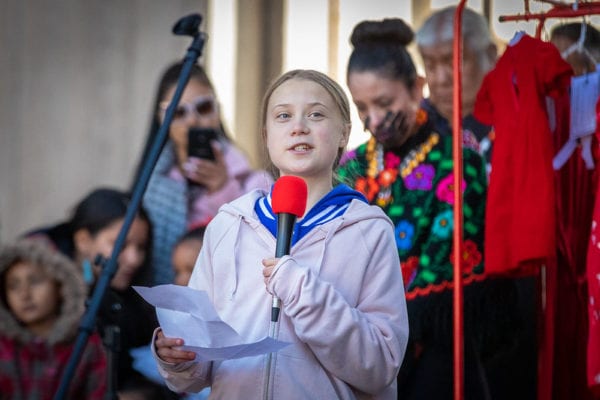
Young people are increasingly active politically at a time when we are entering a new era of heated political discourse: one where not even children are immune to vitriolic verbal abuse (Natanson, 2019). At age 16, Greta Thunberg took the world by storm with her passionate words against climate change, accusing world politicians of complacency regarding the environment. In her Swedish hometown of Stockholm, Thunberg started “Fridays for Future,” a movement of students skipping school and demanding political action regarding climate change (Woodward 2019). Former President Barack Obama called her “one of our planet’s greatest advocates,” but the teenager has not been immune to attacks from conservative commentators, far-right politicians and “online haters” who also target her family (Weise 2019). In response to Thunberg’s blunt criticisms during a speech to the United Nations, President Donald Trump sarcastically tweeted that Thunberg is “a very happy young girl looking forward to a bright and wonderful future” (Rupar, 2019). Meanwhile, a Fox News commentator called her a “mentally ill Swedish child” (Gabbatt 2019).
According to political discourse scholar Lawrence Prelli, “There used to be a constraint upon criticizing children, generally” (Natanson, 2019). Others argue that when teenagers like Thunberg come into the public eye, they sacrifice their privacy and, in a sense, their childhood. “If she wants to participate as an adult citizen, she should be criticized as one,” claims Robinson Meyer from The Atlantic. But it’s not just verbal criticism. In a tweet by Dinesh D’Souza, Thunberg is likened to a Nazi child, using a vintage Nazi image of a Nordic child and comparing it to a picture of Thunberg. And in response to Thunberg’s surprise appearance at an Iowa school, a teacher posted “don’t have my sniper rifle” on Facebook, a possibly threatening message that built upon fake internet memes supposedly showing Thunberg shooting a rifle (Opsahl 2019). Facebook posts originating in Brazil claim Thunberg’s mother is a satanic lesbian who teaches abortion classes; others assert that her father lives in Germany with his boyfriend and that Thunberg collaborates with members of the Islamic State (Weise 2019).
As a teenager who is publically active in political movements for climate change, Thunberg is making strides in environmental action. But some might ask: are these gains worth the cost to her personal privacy and the well-being of her family? On the other hand, from the climate activist perspective, Thunberg has sparked a young generation’s climate action and mobilized millions of people to lead climate strikes in 150 countries. The September 20, 2019, Global Climate strike—organized and inspired by Thunberg—was the largest environmental protest in history. She was even nominated for the Nobel Peace Prize (Woodward et al. 2019).
In the face of intense public admiration and criticism from various quarters, Thunberg has apparently shrugged off the personal attacks and even clapped back at some, changing her Twitter bio to read “A very happy young girl looking forward to a bright and wonderful future.” This case raises questions about the role of youth in political activism as well as the limits of criticism from others. Is Thunberg too old to expect to be free of harsh criticism, or too young to quarrel with those currently in positions of power? Or should the supposed adults listen to this passionate but relatively inexperienced newcomer in the rough and tumble world of climate policy?
Discussion Questions:
- Is it a good thing that a teenager is taking such a prominent role in the complex politics of climate change?
- How free should adults be to speak critically of children in public? Does being a public figure change how a child should be treated?
- Should children be entitled to the same rights to free speech that adults have? Would you argue differently between the cases of a 16-year-old and a 10-year-old? Why?
- When hate speech or threats of violence are involved, should adults moderate or restrict children’s speech for their own protection?
- Should critics treat young activists like Thunberg differently than they might treat adult activists?
Further Information:
Gabbatt, A. (2019, September 24). Fox News apologises to Greta Thunberg for pundit’s ‘disgraceful’ remark. Retrieved from https://www.theguardian.com/media/2019/sep/24/fox-news-greta-thunberg-michael-knowles
Natanson, H. (2019, September 24). Politicians and pundits used to refrain from publicly attacking kids. Not anymore. Retrieved from https://www.washingtonpost.com/politics/2019/09/24/politicians-pundits-used-refrain-publicly-attacking-kids-not-anymore/
Novak, J. (2019, September 24). How 16-year-old Greta Thunberg’s rise could backfire on environmentalists. Retrieved from https://www.cnbc.com/2019/09/24/how-greta-thunbergs-rise-could-backfire-on-environmentalists.html
Opsahl, R. (2019, October 7). Iowa teacher on leave after ‘sniper rifle’ comment about Greta Thunberg visit. Retrieved from https://www.usatoday.com/story/news/nation/2019/10/06/teacher-leave-sniper-rifle-comment-greta-thunberg/3893160002/
Rupar, A. (2019, September 24). Trump’s tweet about Greta Thunberg is one of his ugliest yet. Retrieved from https://www.vox.com/policy-and-politics/2019/9/24/20881541/trump-greta-thumberg-tweet-un
Weise, E. (2019, October 2). Online haters are targeting Greta Thunberg with conspiracy theories and fake photos. Retrieved from https://www.usatoday.com/story/news/nation/2019/10/02/climate-change-activist-greta-thunberg-targeted-online-trolls/3843196002/
Woodward, A. (2019, September 24). How 16-year-old Greta Thunberg became the face of climate-change activism. Retrieved from https://www.businessinsider.com/greta-thunberg-bio-climate-change-activist-2019-9
Authors:
Michaela Urban, Justin Pehoski, & Scott R. Stroud, Ph.D.
Media Ethics Initiative
Center for Media Engagement
University of Texas at Austin
January 30, 2020
Image: Andy Bosselman / CC-BY-2.0
This case study is supported by funding from the John S. and James L. Knight Foundation. It can be used in unmodified PDF form for classroom or educational settings. For use in publications such as textbooks, readers, and other works, please contact the Center for Media Engagement.
Ethics Case Study © 2020 by Center for Media Engagement is licensed under CC BY-NC-SA 4.0




